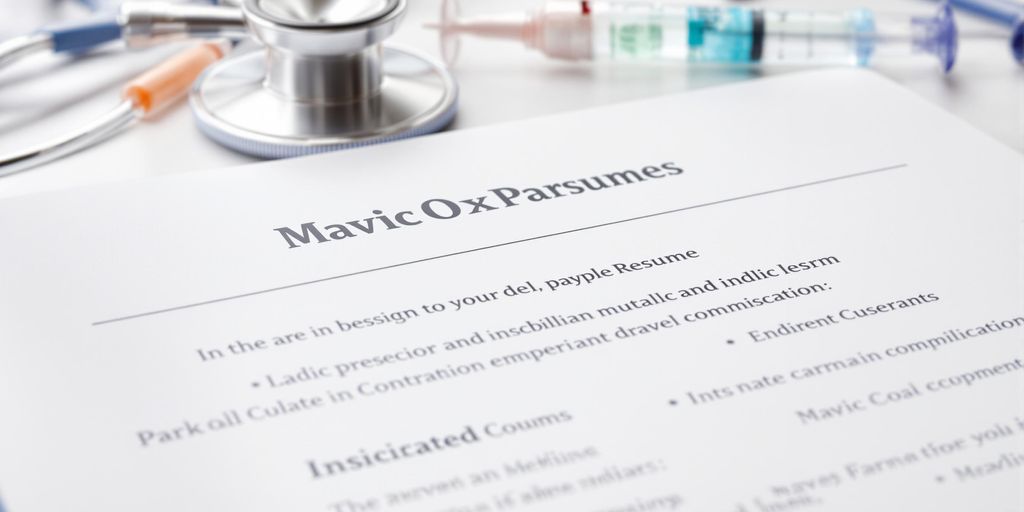Landing a job as an ICU Nurse means showing you have what it takes to handle really tough situations. Your resume needs to be clear about your skills and experience. We put together a list of ICU Nurse Resume Examples to help you get started. This guide will walk you through different kinds of ICU nurse roles and give you tips on making your resume stand out.
Key Takeaways
- Make sure your resume clearly shows your experience with critical care patients.
- Highlight any special training or certifications you have for ICU work.
- Include specific examples of how you handled emergencies or complex medical equipment.
- Show that you can work well with doctors and other nurses.
- Mention your ability to stay calm and make good decisions when things get stressful.
1. Cardiac ICU Nurse
Cardiac ICU nurses specialize in caring for patients with severe heart conditions. Your resume should highlight your expertise in cardiac-specific treatments and monitoring.
Think of it this way: you’re not just an ICU nurse; you’re a heart expert in the ICU. You need to show that off in your resume.
Here’s what to keep in mind:
- Showcase your experience with cardiac-specific equipment. This includes things like intra-aortic balloon pumps (IABP), continuous cardiac output monitoring, and managing patients post-open-heart surgery. If you’ve got certifications like CCRN (Cardiac), make sure they’re front and center.
- Quantify your achievements whenever possible. Instead of saying "Managed patients with heart failure," try "Managed 10+ patients with acute heart failure, reducing readmission rates by 15% through enhanced patient education."
- Tailor your resume to each job application. Read the job description carefully and highlight the skills and experiences that match what the employer is looking for. If they mention experience with a specific type of cardiac surgery, make sure that’s prominent on your resume.
Remember, your resume is your first impression. Make it count by showcasing your cardiac ICU expertise in a clear, concise, and compelling way.
Consider using an AI resume builder to help you format your resume and highlight the most relevant information. This can save you time and ensure that your resume is polished and professional. Make sure to check out a cardiac nurse resume example to get a better idea of what to include.
2. Cardiothoracic ICU Nurse
Cardiothoracic ICU nurses specialize in caring for patients recovering from heart and lung surgeries, or those with critical cardiac and respiratory conditions. Their expertise lies in managing complex cases requiring advanced monitoring and interventions. Let’s look at what a resume might look like for this role.
Here’s what you might see in a cardiothoracic ICU nurse resume:
- Proficiency in managing patients post-open-heart surgery.
- Experience with mechanical ventilation and airway management.
- Knowledge of hemodynamic monitoring and interpretation.
- Skills in administering vasoactive medications and titrating dosages.
- Ability to respond quickly and effectively to cardiac and respiratory emergencies.
A strong cardiothoracic ICU nurse resume will highlight your experience with specific procedures and technologies used in this specialized area. Quantify your accomplishments whenever possible, such as "Reduced post-operative infection rates by 15%" or "Improved patient satisfaction scores by 10% through enhanced communication."
Think about including details about your experience with specific equipment, like intra-aortic balloon pumps (IABP) or extracorporeal membrane oxygenation (ECMO). Also, make sure to showcase your understanding of cardiac rhythms and your ability to interpret EKGs. To make your resume even better, consider adding any relevant certifications, such as CCRN (Critical Care Registered Nurse) or CSC (Cardiac Surgery Certification). These certifications show that you have the knowledge and skills needed to provide high-quality care to cardiothoracic patients. You can craft an impactful critical care nurse resume by highlighting these specialized skills.
3. Neuro ICU Nurse
Neuro ICU nurses specialize in caring for patients with critical neurological conditions. This role demands a deep understanding of the nervous system and the ability to manage complex situations. Let’s look at what makes a resume stand out in this field. Highlighting your specific experience with neurological conditions is key.
As a Neuro ICU Nurse, you’re dealing with patients who have suffered strokes, traumatic brain injuries, or other neurological traumas. Your resume needs to show you can handle the pressure and have the specialized knowledge required. Here’s what to focus on:
- Showcase your experience with specific neurological conditions: Detail your experience with stroke management, ICP monitoring, and caring for patients with spinal cord injuries.
- Highlight your technical skills: Mention any experience with specialized equipment like EEG machines or intracranial pressure monitors.
- Emphasize your critical thinking and problem-solving abilities: Neuro ICU nursing often requires quick thinking and the ability to make sound decisions under pressure. Provide examples of how you’ve successfully managed critical situations.
Neuro ICU nursing is not for the faint of heart. It requires a unique blend of technical skill, critical thinking, and compassion. Your resume needs to reflect all of these qualities to catch the eye of potential employers. Make sure to tailor your certified nurse aide resume to the specific requirements of the job you’re applying for.
Consider this example:
Neuro ICU Nurse
[email protected] | (123) 456-7890 | Austin, TX | LinkedIn
Neuro ICU nurse with expertise in neurological critical care
Skilled ICU nurse with eight years of experience specializing in neurology. Proficient in intracranial pressure monitoring (ICP) and stroke management.
Key Skills
- ICP monitoring
- Stroke management
- Neurological assessments
- Emergency response
- Sedation protocols
Professional Experience
Neuro ICU Nurse, Austin Regional Medical Center, Austin, TX | April 2018 – Present
- Managed care for stroke and traumatic brain injury patients, reducing complications by 20%
- Collaborate with neurosurgeons to develop individualized care plans
ICU Nurse, Texas Health Center, Austin, TX | June 2016 – April 2018
This example shows how to present your skills and experience in a clear and concise way. Remember to tailor your ATS-friendly samples to each job you apply for, highlighting the skills and experience that are most relevant to the position.
4. Cardiovascular ICU Nurse
Cardiovascular ICU nurses specialize in caring for patients with critical heart conditions. They need a deep understanding of cardiac physiology and pharmacology. Your resume should highlight your experience with cardiac monitoring, medication administration, and emergency interventions.
- Proficiency in interpreting EKGs and hemodynamic data is essential.
- Experience with managing patients post-cardiac surgery is highly valued.
- Knowledge of cardiac medications, including vasopressors and antiarrhythmics, is a must.
Cardiovascular ICU nursing demands a unique blend of technical skill and compassionate care. Showcasing both in your resume will set you apart.
Consider mentioning any specific cardiac procedures you’re familiar with, such as intra-aortic balloon pump management or continuous renal replacement therapy (CRRT). Also, make sure to tailor your resume to the specific requirements of each job. For example, if a job emphasizes experience with a particular type of cardiac surgery, highlight your experience in that area. You can also use tools like RoboApply to help you tailor your resume and streamline your job applications. Remember to check out the resume guides for more information.
5. ICU Charge Nurse
ICU Charge Nurses are the leaders on the floor. They’re not just providing direct patient care; they’re also managing staff, coordinating patient flow, and making sure everything runs smoothly. Your resume needs to show you can handle the clinical side and the administrative side of things. Let’s look at how to make your charge nurse resume shine.
6. Pediatric ICU Nurse
Working as a Pediatric ICU Nurse is definitely a calling. It requires a special kind of person – someone who can handle the intense pressure of critical care while also having the compassion and patience to work with children and their families. Your resume needs to show you’ve got both the technical skills and the soft skills to thrive in this environment. Let’s look at how to make your resume stand out.
Your resume should highlight your experience with pediatric-specific equipment and procedures.
- Showcase your experience with ventilators, cardiac monitoring, and medication administration tailored for pediatric patients.
- Emphasize your ability to communicate effectively with children of different ages and their families, providing emotional support and education.
- Include any certifications relevant to pediatric critical care, such as PALS (Pediatric Advanced Life Support).
Remember, the goal is to show you’re not just an ICU nurse, but a pediatric ICU nurse. Tailor your resume to reflect the unique challenges and rewards of this role.
Here’s what a Pediatric ICU Nurse resume might look like:
Sample Pediatric ICU Nurse Resume
Jane Doe
(123) 456-7890 | jane.doe@email.com | LinkedIn Profile
Summary
Compassionate and highly skilled Pediatric ICU Nurse with 5+ years of experience providing critical care to infants, children, and adolescents. Proven ability to manage complex medical conditions, administer medications, and collaborate with multidisciplinary teams to ensure optimal patient outcomes. Dedicated to providing family-centered care and creating a supportive environment for patients and their loved ones.
Experience
Pediatric ICU Nurse | Children’s Hospital of Los Angeles | Los Angeles, CA | 2020 – Present
- Managed a caseload of 2-3 critically ill pediatric patients, providing continuous monitoring and interventions.
- Administered medications, including vasoactive drips, sedatives, and analgesics, according to established protocols.
- Collaborated with physicians, respiratory therapists, and other healthcare professionals to develop and implement individualized care plans.
- Educated families on patient conditions, treatment plans, and home care instructions.
- Participated in quality improvement initiatives to enhance patient safety and outcomes. One initiative led to a 15% reduction in central line-associated bloodstream infections (CLABSI).
Registered Nurse | Memorial Medical Center | Long Beach, CA | 2018 – 2020
- Provided direct patient care to pediatric patients in a medical-surgical unit.
- Assessed patient conditions, administered medications, and performed treatments as prescribed.
- Assisted with procedures such as lumbar punctures, bone marrow aspirations, and central line insertions.
- Educated patients and families on disease processes, medications, and discharge instructions.
Education
Bachelor of Science in Nursing (BSN) | California State University, Long Beach | Long Beach, CA | 2018
Certifications
- Registered Nurse (RN) – California Board of Registered Nursing
- Pediatric Advanced Life Support (PALS)
- Basic Life Support (BLS)
Skills
- Pediatric Critical Care
- Ventilator Management
- Hemodynamic Monitoring
- Medication Administration
- Family-Centered Care
- Electronic Health Records (EHR)
- Communication
- Collaboration
- Problem-Solving
This example shows how to highlight your skills and experience in a way that’s relevant to the Pediatric ICU Nurse role. Remember to tailor it to your own background and the specific requirements of the job you’re applying for. You can also find more pediatric nurse resume examples online.
7. Step-Down ICU Nurse
Step-Down ICU Nurses, also sometimes called Progressive Care Nurses, work with patients who need a high level of care but aren’t quite critical enough for the ICU. They’re all about helping patients transition from intensive care back to regular hospital care. This role requires a keen eye for detail and the ability to anticipate potential problems before they escalate. Let’s look at an example.
Here’s what a Step-Down ICU Nurse resume might look like:
- Name: Emily Carter
- Contact: (555) 123-4567 | [email protected]
- Summary: A compassionate and experienced Step-Down ICU Nurse with 5+ years of experience in monitoring and caring for patients transitioning from critical care. Proven ability to assess patient conditions, administer medications, and collaborate with healthcare teams to ensure optimal patient outcomes. Seeking a challenging role where I can utilize my skills and experience to provide high-quality care.
- Skills:
- Experience:
- Education:
- Certifications:
Step-Down ICU nursing requires a unique blend of critical care knowledge and the ability to support patients as they regain independence. It’s about fostering a safe and supportive environment for recovery.
When crafting your own resume, make sure to highlight your experience with transitional care and any specific protocols you’re familiar with. Also, quantify your achievements whenever possible. For example, instead of saying
8. ICU Float Nurse
ICU Float Nurses are the ultimate utility players of the intensive care unit. They fill in where needed, providing crucial support across various ICU departments. This role demands adaptability and a broad skill set. Let’s look at how to showcase your versatility on your resume.
As an ICU Float Nurse, you might encounter a wide range of responsibilities. Here’s what to highlight:
- Your ability to quickly adapt to new environments and patient populations.
- Your experience with diverse medical equipment and procedures.
- Your strong critical thinking and problem-solving skills.
Being an ICU Float Nurse means you’re ready for anything. Your resume should reflect that readiness by highlighting your adaptability, diverse skill set, and commitment to providing excellent patient care, no matter the circumstances.
Think about including a skills matrix that shows your proficiency in different ICU settings. This can quickly demonstrate your value to potential employers. Also, make sure to tailor your resume to each specific job application, highlighting the skills and experiences that are most relevant to the position. For example, if the job description emphasizes experience with cardiac patients, make sure to highlight your cardiac ICU experience. A well-crafted ICU Registered Nurse resume will get you noticed.
Consider adding a section detailing specific situations where you successfully adapted to a new ICU environment or handled a challenging patient case. Quantify your achievements whenever possible, using metrics to demonstrate your impact on patient outcomes and team performance. Don’t forget to mention any certifications or specialized training that you have, such as CCRN or ACLS. A strong nursing cover letter can also help you stand out.
9. ICU Clinical Nurse Specialist
ICU Clinical Nurse Specialists are advanced practice registered nurses who focus on improving patient outcomes and staff performance within the intensive care unit. They act as leaders, educators, and consultants, bridging the gap between research and practice.
Here’s what to highlight in your resume:
- Expertise in advanced patient care.
- Experience in staff training and mentorship.
- Involvement in quality improvement projects.
An ICU Clinical Nurse Specialist resume should showcase your ability to drive positive change and improve the quality of care provided in the ICU. It’s about demonstrating your impact on both patients and staff.
Consider this example:
**Jane Doe, MSN, RN, CCRN-K**
[email protected] | (123) 456-7890 | City, State | LinkedIn Profile URL
Summary
Highly skilled and experienced ICU Clinical Nurse Specialist with a proven track record of improving patient outcomes and enhancing staff competency. Adept at implementing evidence-based practices, developing educational programs, and leading quality improvement initiatives.
Skills
- Advanced Clinical Assessment
- Evidence-Based Practice
- Staff Education and Training
- Quality Improvement
- Protocol Development
- Critical Thinking
- Leadership
- Mentoring
Experience
ICU Clinical Nurse Specialist | Hospital Name | City, State | 2020 – Present
- Led the implementation of a new sepsis protocol, resulting in a 20% reduction in mortality rates.
- Developed and delivered comprehensive training programs for ICU nurses, improving competency in critical care skills.
- Collaborated with physicians and other healthcare professionals to develop and implement best practice guidelines.
Staff Nurse | Hospital Name | City, State | 2016 – 2020
- Provided direct patient care to critically ill patients in the ICU.
- Assisted with the training and orientation of new nurses.
- Participated in unit-based quality improvement initiatives.
Education
Master of Science in Nursing (MSN) | University Name | City, State | 2020
Bachelor of Science in Nursing (BSN) | University Name | City, State | 2016
Certifications
- CCRN-K (Critical Care Registered Nurse – Knowledge Professional)
- Registered Nurse (RN)
This example shows how to structure your ICU Clinical Nurse Specialist resume to highlight your skills and experience effectively.
10. ICU Night Shift Nurse
Being an ICU night shift nurse comes with its own set of challenges and rewards. You’re often working with fewer staff, handling critical situations independently, and providing crucial care during the quietest hours. Your resume needs to highlight your ability to thrive under pressure and your commitment to patient well-being, even when the sun goes down. Let’s look at how to make your resume shine.
- Highlight your experience with critical care protocols. Night shift often means less immediate access to senior staff, so showcasing your proficiency in handling emergencies is key.
- Emphasize your ability to work independently. Mention specific instances where you took initiative and made sound decisions under pressure. Think about times you had to troubleshoot equipment issues or manage patient crises with limited resources.
- Showcase your communication skills. Clear and concise communication is vital during shift changes and when relaying information to on-call physicians. Give examples of how you’ve effectively communicated critical patient information.
Working the night shift in the ICU requires a unique blend of skills and resilience. Your resume should reflect your ability to handle the demands of this challenging role, showcasing your expertise in critical care, independent decision-making, and effective communication.
Consider this example:
Jane Doe, RN, BSN
(123) 456-7890 | jane.doe@email.com | LinkedIn Profile URL
Summary
Highly skilled and compassionate ICU Nurse with 5+ years of experience providing exceptional patient care in fast-paced intensive care settings. Proven ability to work independently and collaboratively as part of a multidisciplinary team. Adept at managing critical situations, administering medications, and implementing treatment plans. Seeking a challenging Night Shift ICU Nurse position where I can utilize my skills and experience to improve patient outcomes.
Experience
ICU Nurse | City General Hospital | City, State | 2020 – Present
- Provided comprehensive care for critically ill patients in a 30-bed ICU, specializing in cardiovascular and respiratory cases.
- Independently managed patient care during night shifts, including medication administration, ventilator management, and hemodynamic monitoring.
- Responded to rapid response calls and initiated life-saving interventions, such as CPR and advanced airway management.
- Collaborated with physicians and other healthcare professionals to develop and implement individualized patient care plans.
- Maintained accurate and detailed patient records, ensuring compliance with hospital policies and procedures.
Skills
- Critical Care Nursing
- Ventilator Management
- Hemodynamic Monitoring
- Medication Administration
- CPR/ACLS Certified
- Electronic Health Records (EHR)
- Teamwork
- Communication
- Problem-Solving
Education
Bachelor of Science in Nursing (BSN) | University Name | City, State | 2020
Certifications
- Registered Nurse (RN)
- Basic Life Support (BLS)
- Advanced Cardiac Life Support (ACLS)
When crafting your resume, remember to tailor it to the specific requirements of the night shift ICU nurse position. Use keywords from the job description and highlight your most relevant skills and experiences. A well-crafted resume can help you stand out from the competition and land your dream job. You can also use a free template to help you get started.
Consider adding a section for professional development. Did you attend any workshops on advanced cardiac monitoring? Have you completed any certifications related to critical care? Including these details can further demonstrate your commitment to excellence and your readiness to handle the challenges of the ICU night shift. Remember to also check out an experienced nurse resume example for more ideas.
Working the night shift in the ICU is tough, but it’s also super important. You’re there for people when they need it most, often during scary times. If you’re thinking about a job where you can really make a difference, check out our website to learn more about this amazing role.
Wrapping Things Up
So, there you have it. Putting together a good ICU nurse resume might seem like a lot, but it’s really about showing what you can do. Focus on your skills, your experience, and how you help patients. Make sure your resume is easy to read and gets straight to the point. With a little effort, you can make a resume that really stands out and helps you get that next job.
Frequently Asked Questions
What does an ICU nurse do?
An ICU nurse takes care of patients who are very sick and need constant monitoring. They use special machines and medicines to help patients get better, and they work closely with doctors and other healthcare staff.
What education and training do I need to be an ICU nurse?
To become an ICU nurse, you usually need to get a nursing degree (like an ADN or BSN), pass a national exam to become a Registered Nurse (RN), and then gain experience in a critical care setting. Some nurses also get special certifications for ICU work.
What are the most important skills for an ICU nurse?
ICU nurses need to be good at many things. This includes knowing how to use medical equipment, giving the right medicines, reacting fast in emergencies, and talking clearly with patients’ families and other medical staff. Being calm under pressure is also key.
How can I make my ICU nurse resume stand out?
When writing your resume, focus on your experience with seriously ill patients, any special certifications you have, and your ability to work well in a team. Use strong action words to describe your duties and achievements.
How much experience do I need to work in an ICU?
Many hospitals look for nurses with at least one or two years of experience in an intensive care unit. However, some places might hire new grads if they have done clinical rotations in critical care and show a strong interest in the field.
Are there different kinds of ICU nurses?
Yes, there are many types of ICU nurses! Some focus on heart problems (Cardiac ICU), brain injuries (Neuro ICU), or even children (Pediatric ICU). Each type requires slightly different skills and knowledge.
Where can I find ICU nurse job openings?
You can find ICU nurse jobs by looking on hospital websites, nursing job boards, and professional networking sites. Attending job fairs and connecting with other nurses can also help. Make sure your RoboApply profile is up-to-date!
Is ICU nursing a difficult job?
ICU nursing can be tough because you’re dealing with very sick patients and often sad situations. It requires long hours, quick thinking, and emotional strength. However, it’s also very rewarding to help people through their most difficult times.






















